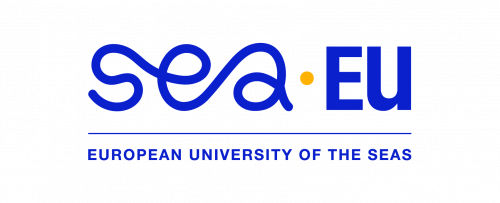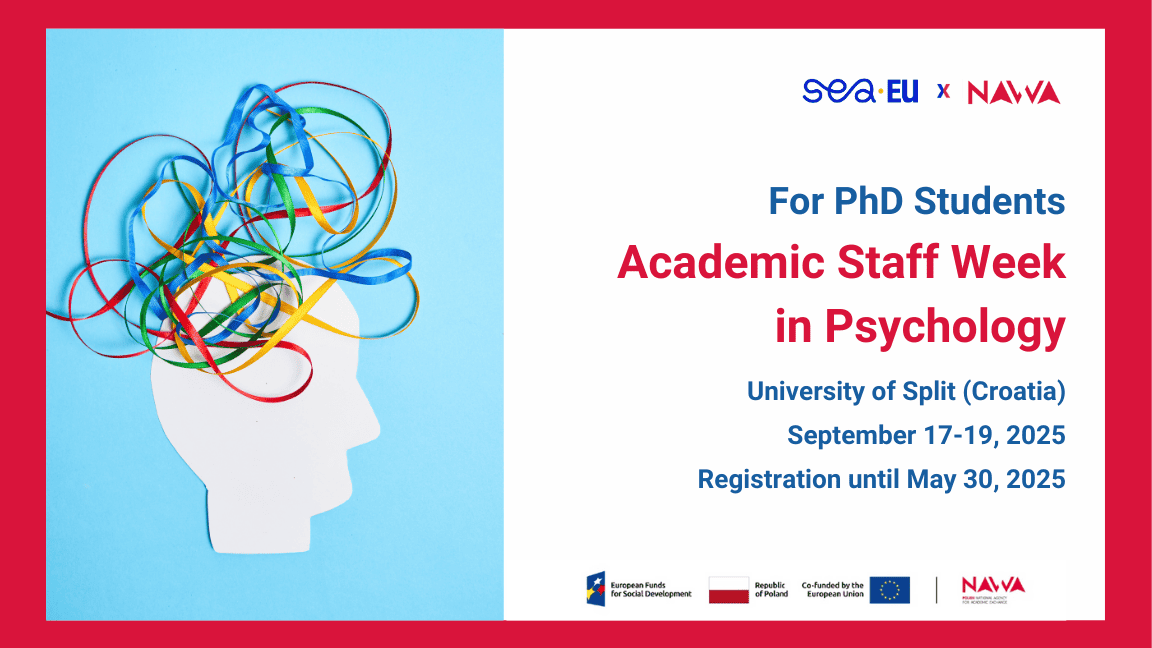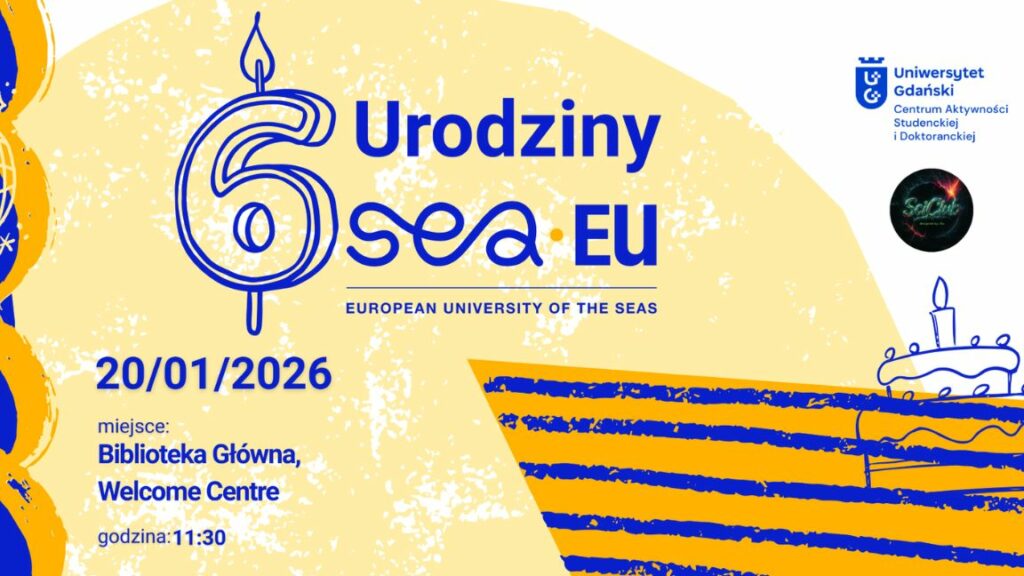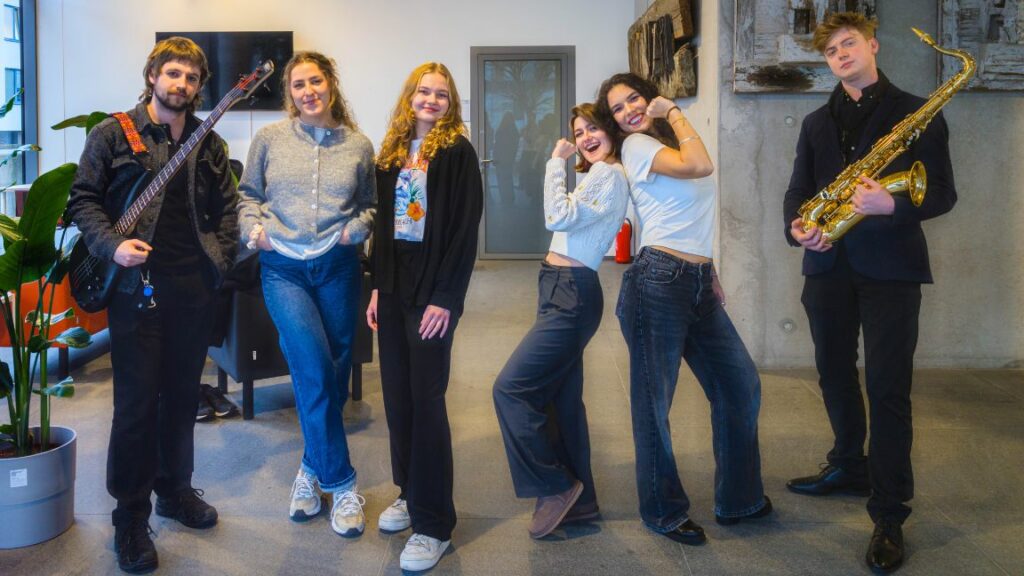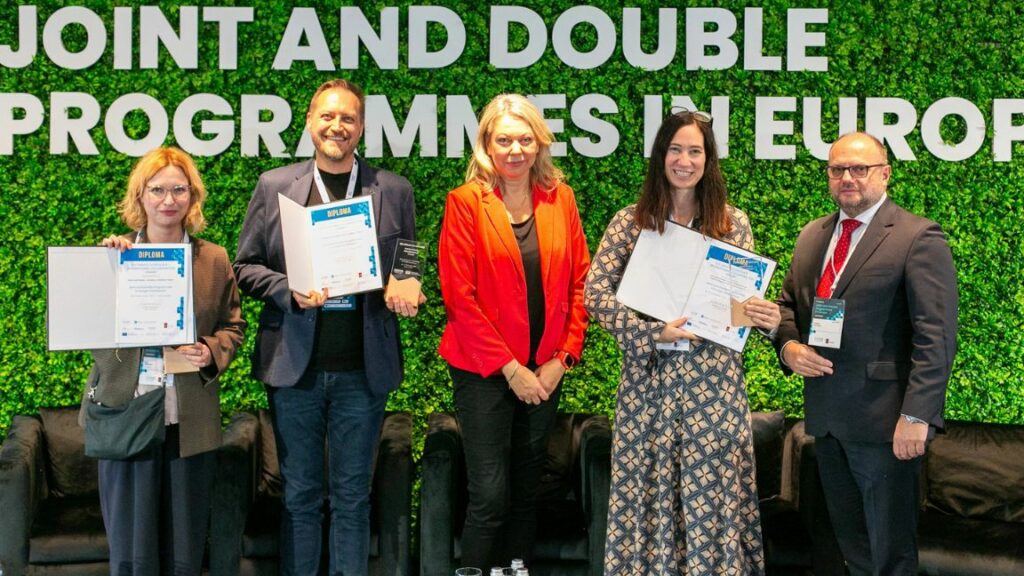Recruitment rules for International Mobility within the SEA-nergy Project
BASIC INFORMATION
Name
Academic Staff Week in Psychology
Objective
The purpose of participating in the event is to enhance support among academic staff in psychology through the development of inter-institutional collaboration, the provision of educational support, and the exchange of best practices between universities that offer psychology study programs. Additionally, the goal is to ensure appropriate psychological support for students throughout their studies.
Destination and duration of mobility
The international mobility will be conducted at SEA-EU’s partner university, University of Split from September 17th to September 19th, 2025.
Detailed program
https://www.nord.no/en/study-programmes/nord-summer-school#programme
Set of learning outcomes (competencies):
- The ability to identify and implement effective mental health support mechanisms for university students and staff.
- The ability to analyze and apply scientific research findings in educational and support practices.
- The development of inter-institutional collaboration skills in the context of education and professional development.
Learning outcomes:
- Knowledge:
The candidate:
1.1 knows and understands the current psychological challenges faced by students and the available support mechanisms within the academic environment.
1.2 has knowledge of the latest research findings on youth development, addictions, and the emotional experiences of teachers.
1.3 knows the opportunities for international scientific and professional collaboration, as well as the principles of publishing research findings. - Skills:
The candidate:
2.1. is able to analyze and compare psychological support models implemented at different universities.
2.2. is able to interpret research findings and use them in designing educational and support activities.
2.3. is able to initiate and develop scientific and professional collaboration in an international context. - Social competencies:
The candidate:
3.1. demonstrates a willingness to engage in initiatives that support the mental well-being of students and university staff.
3.2. collaborates openly and responsibly with representatives of other universities and academic communities, sharing best practices.
3.3. respects ethical principles and the diversity of approaches in designing and implementing educational and support activities.
Criteria for assessing learning outcomes:
The candidate:
| Learning outcome | Verification criteria | Form of verification |
| 1.1. knows and understands the current psychological challenges faced by students and the available support mechanisms within the academic environment | 1.1.1. is able to identify and describe the main psychological challenges faced by students during their studies 1.1.2. identifies and characterizes the forms of psychological support offered by universities | Test |
| 1.2. has knowledge of the latest research findings on youth development, addictions, and the emotional experiences of teachers | 1.2.1 describes the main findings from current research on youth development and addictions in the general population 1.2.2. presents knowledge of the emotional experiences of teachers based on empirical data | Test |
| 1.3. knows the opportunities for international scientific and professional collaboration, as well as the principles of publishing research findings | 1.3.1 identifies specific forms and platforms for international scientific collaboration and knows the principles for establishing such contacts 1.3.2. describes the stages of the scientific publication process and the basic principles of ethics and quality in publishing research findings | Test |
| 2.1. is able to analyze and compare psychological support models implemented at different universities | 2.1.1. analyzes the key elements of psychological support systems functioning at different universities 2.1.2. compares the strengths and weaknesses of selected support models, drawing conclusions about their effectiveness and potential for adaptation | Test |
| 2.2. is able to interpret research findings and use them in designing educational and support activities | 2.2.1 analyzes and interprets research findings in the context of the needs of students and the academic environment 2.2.2 based on research findings, proposes specific educational or support actions tailored to the realities of the university | Test |
| 2.3. is able to initiate and develop scientific and professional collaboration in an international context | 2.3.1 establishes and maintains contacts with representatives of foreign institutions to carry out joint scientific or educational activities 2.3.2 proposes forms of international collaboration, taking into account the shared goals, resources, and needs of the participating parties | Test |
| 3.1. demonstrates a willingness to engage in initiatives that support the mental well-being of students and university staff | 3.1.1 actively participates in discussions, workshops, or projects related to mental well-being in the academic environment 3.1.2 proposes specific solutions or actions to support the mental health of students and academic staff | Test |
| 3.2. collaborates openly and responsibly with representatives of other universities and academic communities, sharing best practices | 3.2.1 actively participates in the exchange of experiences and knowledge with representatives of other academic institutions 3.2.2 presents examples of best practices from their university and openly accepts proposals and solutions used in other environments | Test |
| 3.3. respects ethical principles and the diversity of approaches in designing and implementing educational and support activities | 3.3.1 takes into account diverse needs, cultural, and social perspectives when proposing educational and support activities 3.3.2 applies professional and academic ethics in planning and discussing support initiatives | Test |
REQUIREMENTS FOR MOBILITY
Participants of the mobility
To apply for the mobility, candidate must be an active PhD student of the University of Gdańsk on the day of applying for the recruitment process and the planned mobility. Applicants are not allowed to be on any type of leave.
The participant’s declared English language level is a minimum of B2.
Recruitment
All candidates are required to complete a special registration form at: https://forms.office.com/e/LEqEjnr1Pt One of the elements of the application form is a cover letter justifying the choice of mobility which should raise the candidate’s competence. The form must be completed and submitted by May 30th, 2025.
The order of funding allocation depends on the total number of points obtained – applications with a higher total score will have priority in funding allocation and will be processed according to the ranking list.
Those who have submitted a complete set of required documents and meet the mobility requirements may be qualified to participate in the mobility. Funds for this purpose have been allocated for three people.
Recruitment is conducted in accordance with the horizontal principles outlined in § 2 point 8 of the Project Regultions. If support is needed during the recruitment process for persons with disabilities or special needs, please contact the task coordinator seaenergy@ug.edu.pl.
Recruitment criteria
| 1 | Formal criteria | Fulfilled |
| PhD student status | ||
| required English level – minimum B2 | ||
| complete application | ||
| Substantive criteria | Scoring | |
| 2 | the substantive evaluation of the cover letter justifying the choice of mobility which should contribute to enhancing competencies | 0-5 |
| 3 | alignment of the thematic scope of the mobility with the academic curriculum of the pursued field of study | 0-5 |
| 4 | alignment of the mobility with the research focus of the PhD thesis | 0-5 |
Recruitment results
The committee responsible for verifying and evaluating the applications is required to prepare a ranking list, dividing it into the list of qualified candidates, reserve candidates, and those who do not meet the criteria. All candidates participating in the recruitment process will be individually informed about the results via email by June 5th, 2025. The list of selected candidates will also be available on the website https://sea-eu.ug.edu.pl/aktualnosci/.
RULES FOR PROVIDING SUPPORT
Funding may be granted for the implementation of the mobility between 17 and 19 September 2025, plus two days for travel. The funding is paid as a lump sum of approximately 4125 PLN and covers travel, accommodation, and per diem expenses. Detailed list of funding rates is available on the website.
Documentation before mobility Those who are qualified for mobility are required to complete the following:
- an online pre-test which will assess the participants’ knowledge and skills related to the course content before starting the course,
- registration on the NAWA platform to confirm the participant’s eligibility for the project,
- an online registration form for the organizing institution,
Documentation after mobility Those who complete the mobility are required to:
- complete an online post-test which measures the participants’ knowledge and skills after the course,
- provide the original certificate of stay at the partner university.
Completion of mobility Those who according to the test have improved their competencies during the mobility will receive a certificate.
The verification of learning outcomes includes completing a post-test, in which the participant should achieve a higher score compared to the pre-test in order to receive a certificate of competence enhancement. Both tests are completed remotely via the Microsoft Forms application.
Contact to Coordinator: seaenergy@ug.edu.pl
The initiative is being implemented as part of the project „Support for Synergistic and Complementary Actions of the SEA-EU 2.0 Project – SEA-nergy,” which is part of the NAWA program „Support for European University Alliances” funded by the European Social Fund
